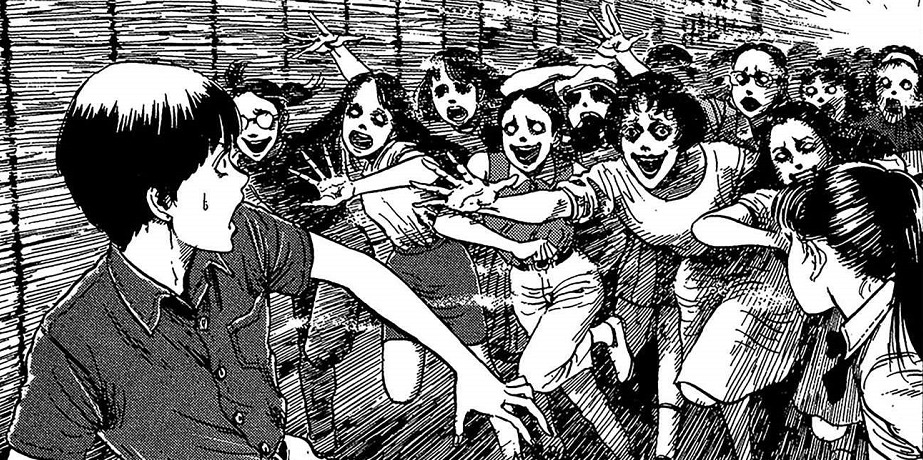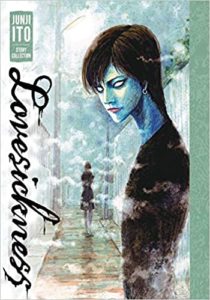
Terror  and Introspection
and Introspection
There’s no denying the power of Junji Ito’s ability to terrify and entertain global audiences. In this story collection, translating several of his classic tales, Lovesickness explores love, dysfunctional families, and cosmic horror with a splash of black humor and haunting visuals.
The collection is divided into two sections. The first half collects the titular horror serial “Lovesickness,” a story about a foggy town obsessed with fortune-telling. The latter focuses on a few smaller, more contained tales. The rest is a collection of shorter tales that share some of the twisted horrors takes Ito is known for.
Best known for his horror classic Uzumaki (about a town that falls victim to a mysterious spiral) and Tomie (a collection of loosely connected stories about the titular character, a beautiful and otherworldly girl who brings ruin to everyone who meets her), Junji Ito is a Master of Modern Horror. Lovesickness is the latest volume of Ito’s short stories to be translated into English from VIZ Media, following other collections of his short work–including Venus in the Blind Spot, Shiver, and Smashed.
Fortunately, Ito’s work can be read in any order, letting you dive right into the stories. Most of these stories were originally published in the late 90s and early 2000s and they reflect that period, catering to the rise in urban legend horror (and serving as a precursor to today’s Creepypasta) like The Ring (1998) and The Grudge (2004). In many ways, they feel as if they belong in another era which, for some, may contribute to their overall otherworldliness as much as the tales themselves.
Lovesickness
 When teenager Ryusuke and his family move back to Nazumi, the small town where he grew up, he finds that the past has been waiting for him in unexpected ways. Reunited with old friends–and an old crush–he discovers the town’s peculiar obsession with fortune-telling. The popular ritual involves a person standing on a street corner on a foggy day. When someone approaches, they ask the stranger to tell their fortune, often asking a question about their future love life or present situation. While this feels like a harmless pastime, it quickly dissolves into a story of fate and obsession.
When teenager Ryusuke and his family move back to Nazumi, the small town where he grew up, he finds that the past has been waiting for him in unexpected ways. Reunited with old friends–and an old crush–he discovers the town’s peculiar obsession with fortune-telling. The popular ritual involves a person standing on a street corner on a foggy day. When someone approaches, they ask the stranger to tell their fortune, often asking a question about their future love life or present situation. While this feels like a harmless pastime, it quickly dissolves into a story of fate and obsession.
This tale twists into something far more complicated than it originally appears. Past secrets reveal that something sinister is going on and people begin to meet unfortunate ends. Suicide features heavily in this volume; lovelorn girls are driven to drastic measures by a force beyond their control. Eventually, the story shifts to the urban legend of a strange, beautiful boy at the crossroads.
Like much of Ito’s work, the art does most of the heavy lifting in these tales. Junji Ito never fails to produce chilling, suspenseful scenes that keep you turning pages just to discover the next twist. He never shies away from grotesque imagery–though it always manages to feel at home in his surreal, nightmarish worlds. The town itself becomes more of a character than a setting. Nazumi’s foggy streets and shapeless, mazelike structures keep the reader guessing as much as the characters within.
Each death and the shadowy ghosts that subsequently lurk along the street corners are as horrific as they are compelling. You can’t skip over the details in his art. Ito’s work won’t let you look away. Ultimately, this story rests on its examination of desire and how we perceive the inevitability of fate in our lives. It’s an urban legend unfolding even as the people involved aren’t able to stop themselves from creating it.
The Strange Hikizuri Siblings
The next two stories in the collection feature the “Strange Hikizuri Siblings,” which blend dark comedy and horror elements. These unusual siblings are just as weird as their schemes and familial relationships. Selfish, morbid, and delightfully bizarre, the author designs their family dynamic to make you uncomfortable, and also give readers a bit of a laugh. These stories feel more akin to a black comedy than a serious scare. These will most likely resonate with fans of Ito’s fan-favorite tales of Soichi: a sadistic child who torments those around him, only to face karma for his actions.
It’s a bit of a break from the earlier serial, so it can feel abrupt by comparison. However, I’d argue that this is just representative of Ito’s work: you are never quite sure what you’re going to get next.
Other Tales
There are a few other tales in this collection, as well. “The Rib Woman” explores the complex relationship young women often have with their bodies and the concept of beauty. Unhappy with her body and convinced that the shape of her ribs are the problem, Yuki considers plastic surgery as an option to define her (already slender) waist. Unfortunately, she isn’t the only one to be caught up in her desire to feel beautiful at any cost. As she and her friend find themselves haunted by a melody only they seem to hear, readers begin to wonder how the two are connected. When the truth is revealed, it’s suitably bizarre and terrifying!
The mysterious music the female characters hear–which their male companions cannot–speaks to the pressure felt almost exclusively by women. This tale taps into our unconscious fears about the side-effects of body modifications as well as our desire to be seen as beautiful. This very human desire twists into something horrific and pathological throughout this short.
The last, “Memories of a Real Poop,” is a two-page semi-autobiographical glimpse into Junji Ito’s childhood. It’s awkward and delightfully strange in a way that only this author can achieve.
Final Thoughts
This collection feels disjointed. There’s no overarching theme like some of the other English language collections (Shiver comes to mind) and they aren’t collected chronologically by publishing date, either. Still, it’s a great way to get your hands on some lesser-known work from the author. While I wouldn’t call any of the stories in Lovesickness a favorite of mine, they’re all effective. Junji Ito is at his best when he’s pulling apart aspects of everyday life and revealing how unsettling it can be.
Lovesickness is a great addition to any Ito fan’s collection. It’s heavy on existential horror, and it also includes moments of absurdity and dark humor that are both confounding and entertaining. While not as great an introduction to his work as earlier translated short work collections (e.g. Venus in the Blind Spot), Lovesickness once again demonstrates the versatile nature of Ito’s work.


![[ADVANCE REVIEW] FAMILY TREE #1 UPROOTS YOUR NOTION OF A BODY HORROR COMIC](https://geekd-out.com/wp-content/uploads/2019/10/FAMILYTREE_PROMO_HESTER_WIDEv2-small-150x150.jpg)

